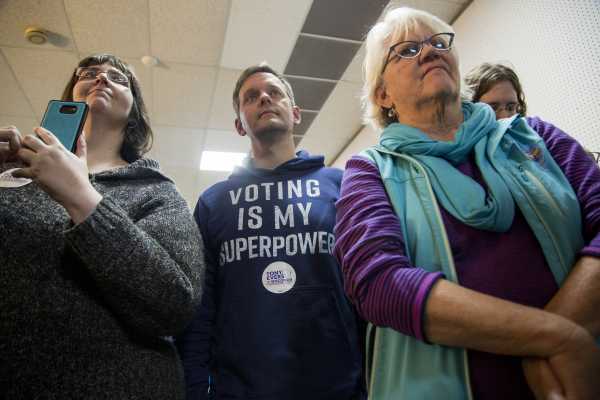
Democrat Roy Cooper was weeks away from being sworn in as the new governor of North Carolina, when outgoing Republican Gov. Pat McCrory called a special session of the legislature under the guise of helping the victims of natural disasters. Instead, he was orchestrating a plan to severely limit the incoming Democratic governor’s power.
Within 48 hours, on a late December night in 2016, the Republican-controlled state legislature passed a series of bills that pulled Cooper’s ability to make key cabinet appointments without their approval, drastically cut the size of Cooper’s administration, and changed the Board of Elections so that Republicans would control it in election years. They ensured lawsuits had to first go through the Republican-controlled appeals court, before the Democratic-majority state Supreme Court.
Democrats — who thought of Cooper’s victory as one of the few bright spots in an otherwise devastating year for the party — were blindsided.
“To pull off an ambush like that, all the Republicans had to be in on it,” state Sen. Jeff Jackson (D) said. “They started filing bills that were 40 pages long. They had been working on this for weeks.”
Cooper has been fighting these changes in the courts ever since, to varying degrees of success. The supermajority of Republicans has rendered him “very ineffective,” said Bob Phillips, the executive director of Common Cause North Carolina, a voting rights and campaign finance group in the state.
Now two years later, Democrats in Wisconsin and Michigan are staring down the same fate. Republican-majority legislatures are pushing to pass sweeping changes to voter access, the judiciary, and the governors’ abilities to enact the policies they campaigned — and won — on.
Rather than doing the soul-searching that often comes after an electoral loss, Republicans are changing the rules to shield themselves from election outcomes. They are making the government less responsive to the popular will.
“North Carolina set a precedent in playing a kind of political hardball that we haven’t seen in other places,” Rick Hasen, an election law scholar with the University of California Irvine, said. “Does it spiral out of control? This has been more asymmetric with Republicans, but I don’t think it would always stay that way.”
North Carolina has become a playbook for Republicans across the country
It’s hard to understate how difficult Cooper’s tenure has been.
It started in 2016, before he took office, when Republicans’ power grab was explicit. Cooper and Democrats at the top of the ballot had won the election — narrowly — but an extremely gerrymandered state map allowed Republicans to keep a supermajority in the state legislature. They have been using that to their advantage.
“There was no pretense of justification at all,” Jackson said of Republicans’ actions in the lame-duck session. “There was no attempt to defend their actions in terms of Democratic appropriateness.”

By January 1, 2016:
- Cooper’s administration had been cut from 1,500 appointed positions to around 400 — a number which was originally expanded from 400 for McCrory in 2013.
- The governor’s cabinet appointments had to be approved by the state Senate, which was controlled by Republicans.
- The state’s nonpartisan Supreme Court election process was turned into a partisan one. In other words, Supreme Court nominees now have a “(D)” or “(R)” next to their names on the ballot.
- The makeup of the state and county board of elections were changed from being run by the governor’s party, to equally bipartisan boards, rigged to be led by Republicans in election years and by Democrats in nonelection years.
His governorship has been marked by repeated vetoing of Republican legislation — only to see the vetoes overturned by Republicans.
Cooper has taken part in lawsuit after lawsuit, arguing that the changes violate the state’s constitution about the separation of powers. Some of the changes first passed in 2016, have since been reversed — or changed. Just this week, Republicans proposed the Board of Elections return under the governor’s control, but separated from an ethics commission, which would have equal Republican and Democratic representatives.
But now, in states like Wisconsin and Michigan, an eerily similar turn of events is playing out. As Democrats Tony Evers (D-WI) and Gretchen Whitmer (D-MI) stand poised to take over, Republican legislatures are rushing to pass measures to curb their power.
In Wisconsin, some of these proposals passed on Wednesday, and Republican Gov. Scott Walker said he would sign them into law. In all, they would limit Evers’s power to change policies around welfare, health care, and economic development, cut down early voting, and allow the Republican-led legislature to undermine the attorney general, giving them the power to block his decision to remove Wisconsin from federal lawsuits.
“Power-hungry politicians rushed through sweeping changes to our laws to expand their own power and override the will of the people of Wisconsin who asked for change on November 6th,” Evers said in a statement.
In Michigan, a Republican proposal would guarantee the GOP-controlled legislature the right to intervene in any legal battles involving state laws that the attorney general may be reluctant to defend, like restrictions for same-sex couples looking to adopt.
“It feels like I lived through that same thing,” Jackson said, seeing what’s happening in Wisconsin. “I feel for them.”
It all goes back to gerrymandering
Democrats in North Carolina, Wisconsin, and Michigan share the understanding that the levers of democracy are designed work against them.
In Michigan, the maps drawn after the 2010 census have resulted in Republican lawmakers in nine of the 14 congressional seats, even in years Democrats won the popular vote. On the state level, even in 2018, when the state utterly rebuked Republican leadership at the top of the ballot handing Democrat Whitmer a 10-point victory, Republicans will go into January with a 22-16 majority in the state Senate and a 58-52 majority in the state House.
North Carolina’s history with gerrymandering is even more extreme. In 2016 Republicans redrew the maps, because the 2011 maps were deemed unconstitutional for racial bias. And as Vox’s Ella Nilsen reported extensively, Republicans made sure the 2016 maps were “just” partisan — and they explicitly admitted doing so:
“I propose that we draw the maps to give a partisan advantage to 10 Republicans and three Democrats, because I do not believe it’s possible to draw a map with 11 Republicans and two Democrats,” Republican state Rep. Dave Lewis said at a House hearing in 2016.
“These Republicans have gerrymandered their way to have power over everything,” Billy Corriher, a researcher with North Carolina progressive advocacy group Facing South, said.
The same goes for Wisconsin.
The results of the 2018 midterm election, which brought Democratic wins for governor, attorney general and more, state Republicans still retain 63 of the state’s 99 house seats.
It’s in these states that Republicans are staging their power grabs — ensuring that even if a Democrat wins at the top of the ticket, they’ll be rendered ineffective, and implementing voter suppression laws going into a presidential year.
“Isn’t it interesting that there are some few states — places where redistricting is the hot topic — and the stakes around voting rules are higher,” Barry Burden, a political scientist with the University of Wisconsin Madison, said. “Wisconsin is going to be ground central for the next presidential election.”
Undermining democracy will have serious long-term effects
This isn’t normal. There’s a basic understanding in a democracy that when one party wins, they have won.
But Republicans across the country are explicitly rejecting election outcomes. In Wisconsin, the Republican state House Speaker Rep. Robin Vos said the reforms were necessary because otherwise, he said, “we are going to have a very liberal governor who is going to enact policies that are in direct contrast to what many of us believe in.”
These legislatures are turning to extremes, and before long those extremes can become the new norm.
“It’s a further devolution of norms of democracy, where the losers accept the results of an election and move on,” Hasen said. “This is about polarization generally, and a break down of political norms.”
Hasen pointed to ideas like court-packing — or adding more seats to the court — as an area Democrats could also be pushing the legal bounds of democracy. It’s considered the nuclear option for Democrats, but has gained more steam in liberal circles as Republicans maintain control in spite of losing popular vote margins.
North Carolina Democratic state Rep. Chaz Beasley, however, doesn’t see it that way. In his state, there have been several signs that Republicans’ firewall is breaking — or at least some of these power grabbing tactics are backfiring.

“When people touch this hot stove enough, saying that they will stop touching the hot stove is hopeful, but they’ve also been burnt,” Beasley said.
Democratic candidates made substantial gains in the legislature this midterm cycle — even without any major statewide elections on the ballot. Next year, Republicans will lose their supermajority in the legislature and Cooper will regain his veto power.
Two constitutional amendments on the ballot, which Republicans put forward to further restrict Cooper’s power over state boards and commissions, failed. And in spite of efforts to make the Supreme Court elections partisan, Democrat Anita Earls took the victory — giving Democrats in the state more hope going into legal battles over gerrymandering.
For two years, Cooper’s governorship has been reduced to two jobs: energize the people of North Carolina around an explicit Republican power grab, and a fight in the courts. Wisconsin and Michigan Democrats are likely facing the same fate.
Sourse: vox.com






